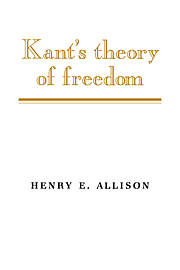Book contents
- Frontmatter
- Contents
- Acknowledgments
- Note on sources and key to abbreviations and translations
- Introduction
- Part I Freedom and rational agency in the Critique of Pure Reason
- Part II Moral agency and moral psychology
- 5 Rational agency and autonomy
- 6 Duty, inclination, and respect
- 7 Wille, Willkür, and Gesinnung
- 8 Radical evil
- 9 Virtue and holiness
- 10 The classical objections
- Part III The justification of morality and freedom
- Notes
- Bibliography
- Index
10 - The classical objections
Published online by Cambridge University Press: 05 June 2012
- Frontmatter
- Contents
- Acknowledgments
- Note on sources and key to abbreviations and translations
- Introduction
- Part I Freedom and rational agency in the Critique of Pure Reason
- Part II Moral agency and moral psychology
- 5 Rational agency and autonomy
- 6 Duty, inclination, and respect
- 7 Wille, Willkür, and Gesinnung
- 8 Radical evil
- 9 Virtue and holiness
- 10 The classical objections
- Part III The justification of morality and freedom
- Notes
- Bibliography
- Index
Summary
Although many objections to various aspects of Kant's conception of moral agency and moral psychology have been considered in the preceding four chapters, we have not yet dealt explicitly with a line of objection that deserves to be termed “classical” because of its long and distinguished history. This line can be traced back to some of Kant's most important contemporaries and immediate successors, most notably Schiller and Hegel, and it reappears in the work of influential present-day writers such as Bernard Williams. Thus, it seems appropriate to conclude this portion of the study with a consideration of its essential features and the formulation of a possible Kantian response.
This consideration must be prefaced, however, with two large caveats. First, since this line reflects the criticisms of thinkers with quite different overall philosophical commitments, who attack Kant from quite different points of view, it would require a separate book (and a lengthy one at that) to deal adequately with all of the points at issue and to consider the differing nuances of the various criticisms. Accordingly, I shall limit myself to the attempt to express the main thrust of this line of objection as it is reflected in the criticisms of Schiller, Hegel, and Williams, followed in each case by a brief sketch of a possible (in the case of Schiller, at least in part, an actual) Kantian rejoinder.
- Type
- Chapter
- Information
- Kant's Theory of Freedom , pp. 180 - 198Publisher: Cambridge University PressPrint publication year: 1990
- 1
- Cited by



